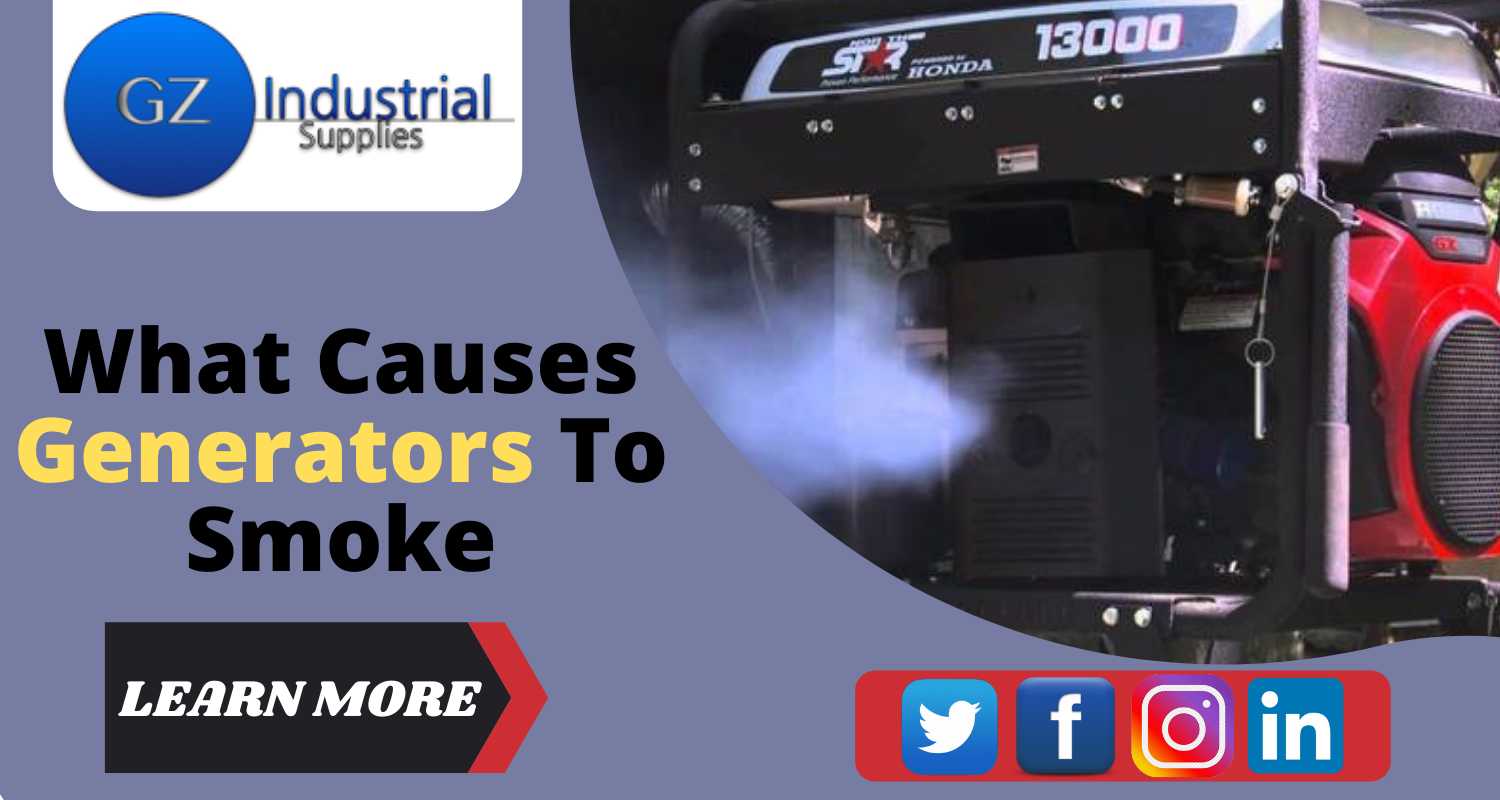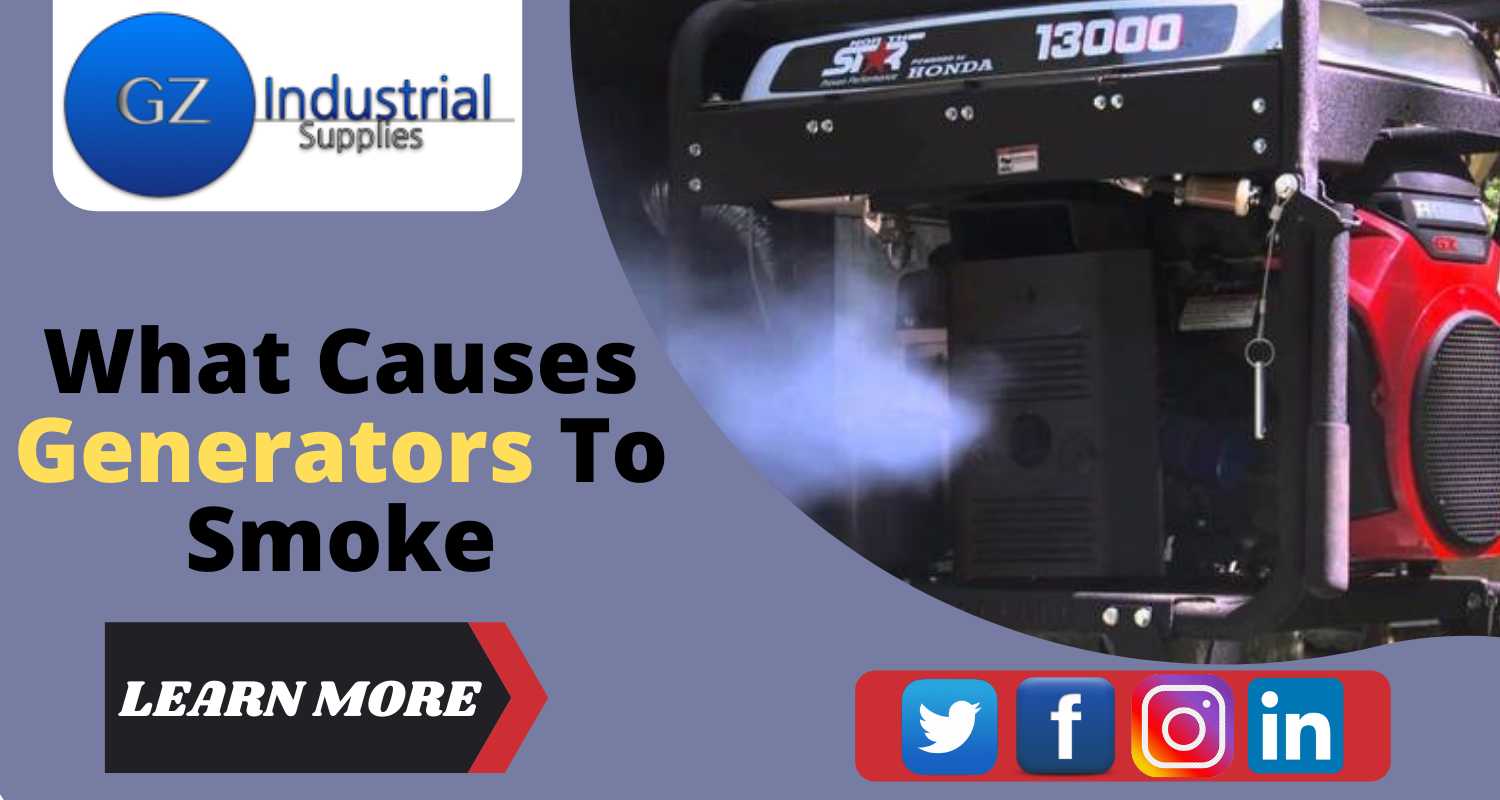Disclosure: This post contains affiliate links and I will be compensated if you make a purchase after clicking through my links. Learn More
Your generator is smoking because there’s likely a problem inside. Smoke usually means something is wrong with the engine or fuel.
Generators are essential for providing power during outages or in remote areas. Seeing smoke can be alarming and signifies underlying issues that need addressing. This problem can stem from various sources, such as oil leaks, fuel problems, or mechanical failures.
Understanding why your generator is smoking is crucial to prevent further damage and ensure it operates safely. In this post, we’ll explore common reasons for smoke and how you can fix them. By identifying the cause early, you can keep your generator running smoothly and avoid costly repairs. Let’s dive into the details and find out what’s causing your generator to smoke.

Credit: www.gz-supplies.com
Common Causes Of Generator Smoking
Generators are essential during power outages. But, seeing your generator smoke can be alarming. Understanding the common causes helps in addressing the issue quickly. Here are some common reasons why your generator might be smoking.
Fuel System Issues
One common cause of generator smoking is fuel system issues. Dirty or old fuel can lead to incomplete combustion. This results in black smoke. Check the fuel filter. It might be clogged. Replace it if necessary. Also, ensure you are using the correct fuel type.
Oil Leaks
Oil leaks can cause your generator to smoke. If oil seeps into the combustion chamber, it burns with the fuel. This creates blue or white smoke. Regularly inspect your generator for oil leaks. Check the gaskets and seals. Replace them if they are worn out. Keeping an eye on oil levels also helps. Overfilled oil can lead to leaks.

Credit: www.gz-supplies.com
Signs Of Fuel System Problems
Generators can sometimes show signs of fuel system problems. When your generator starts smoking, it could be a sign that something is wrong. Understanding these signs can help you fix issues before they become serious.
Black Smoke
Black smoke is a common sign of fuel system problems. It usually means there is too much fuel and not enough air in the combustion chamber. This imbalance can lead to incomplete burning of fuel, causing black smoke.
Check the air filter. A clogged air filter can restrict airflow. Cleaning or replacing the filter can solve the issue. If the problem persists, inspect the fuel injectors. They might be delivering too much fuel.
Poor Fuel Combustion
Poor fuel combustion can cause your generator to smoke. This happens when the fuel does not burn completely. It might be due to bad fuel or faulty spark plugs.
Ensure you are using clean, fresh fuel. Old or contaminated fuel can affect combustion. Check the spark plugs as well. Worn or damaged spark plugs need replacement to ensure proper combustion.
Oil Leak Indicators
Is your generator puffing smoke like a steam engine? If so, it’s time to get to the bottom of it. One possible cause could be an oil leak. Recognizing oil leak indicators can save you from bigger headaches down the road. Here, we’ll focus on two key indicators: blue smoke and oil drips under the generator.
Blue Smoke
Have you ever noticed a bluish tinge in the smoke coming from your generator? This is a classic sign of burning oil. The blue smoke usually means that oil has slipped into the combustion chamber. It’s not just annoying, it’s a sign that your generator needs attention. Ignoring it can lead to more serious issues.
Think about the last time you had a leaky faucet at home. It started with a drip, right? But ignoring it could lead to a flooded kitchen. The same goes for your generator. Blue smoke is your early warning system. Address it quickly.
Oil Drips Under Generator
Have you looked under your generator lately? If you see oil drips, you have a leak. Even small puddles can be a big deal. It’s not just messy; it’s a clue that something is wrong internally. Maybe a gasket is worn out, or a seal has failed.
I once ignored a few oil drips under my generator, thinking it was no big deal. A week later, the drips turned into a steady stream, and I was left with a dead generator right before a big camping trip. It was a hard lesson learned.
So, check under your generator regularly. Spotting oil drips early can save you from costly repairs. It’s a small step that makes a big difference.
Have you experienced any of these oil leak indicators? Don’t wait for your generator to break down. Taking action now will ensure it runs smoothly when you need it most.
Air Filter And Its Role
The air filter in your generator plays a vital role. It ensures clean air reaches the engine. This helps in efficient combustion. A clean air filter means a smooth-running generator.
When the air filter gets clogged, it hampers performance. The engine struggles to breathe. This can lead to smoking issues. Understanding and maintaining the air filter is crucial.
Clogged Air Filter
A clogged air filter restricts airflow. This causes the engine to work harder. It may burn more fuel. Incomplete combustion may occur, leading to smoke. Dirt and debris build up over time. This can block the filter.
Check your air filter regularly. Look for signs of dirt. If you see a lot of buildup, it’s time for a change. A clean filter ensures better airflow. This helps prevent smoking issues.
Replacing The Air Filter
Replacing the air filter is simple. First, locate the air filter housing. Open it carefully. Remove the old filter. Check for dirt and debris inside the housing. Clean it if necessary.
Insert the new filter. Ensure it fits properly. Close the housing securely. Start the generator. Listen for any unusual sounds. A new filter helps the engine run smoothly. It reduces the chances of smoking. Regular maintenance keeps your generator in top shape.
Impact Of Overloading
Overloading your generator can cause it to smoke. This happens when it struggles to handle too much power.
Overloading your generator can cause it to smoke excessively. This not only affects its performance but also its lifespan. Understanding the impact of overloading is crucial to maintaining a healthy generator.
Excessive Load
When you put too much load on your generator, it struggles to keep up. This can lead to overheating and smoking. Imagine trying to run a marathon while carrying a heavy backpack—you’ll get tired fast, and so will your generator.
Overloading can cause the internal components to work harder than they should. This stress can result in the engine burning more fuel than necessary. The excess fuel combustion creates black smoke, signaling that your generator is in distress.
In my experience, I once tried to power my entire house with a small generator. It started smoking within minutes. I quickly realized I was asking too much of it.
Generator Capacity
Every generator has a specified capacity it can handle. Exceeding this capacity can lead to smoking and other issues. Knowing your generator’s limits can save you from potential headaches.
Check your generator’s manual for its wattage rating. This will tell you how much load it can handle. If you need to power multiple devices, calculate their total wattage and ensure it doesn’t exceed the generator’s capacity.
For instance, powering a refrigerator, a TV, and a few lights might be fine. But adding a space heater could push it over the edge. This is where many people make mistakes.
Are you aware of your generator’s capacity? It’s a simple yet vital piece of information. Ignoring it can lead to costly repairs and downtime.
By understanding the impact of overloading, you can avoid unnecessary smoke and keep your generator running smoothly.
Maintenance Tips To Prevent Smoking
Maintaining your generator can prevent it from smoking. Regular upkeep ensures it runs smoothly and prolongs its life. Follow these maintenance tips to keep your generator in top shape.
Regular Inspections
Regular inspections help spot issues early. Check for any signs of wear and tear. Inspect wires, filters, and other components. Look for cracks, rust, or any damage. Early detection can prevent bigger problems.
Timely Oil Changes
Oil changes are essential for generator health. Old oil can cause smoking and damage. Change the oil as per the manufacturer’s recommendations. Fresh oil keeps the engine lubricated. It helps the generator run smoothly.
When To Seek Professional Help
Smoke from a generator can indicate serious issues. Seek professional help if you notice unusual colors or strong odors. Prompt attention can prevent further damage and ensure safety.
Owning a generator is handy. But what do you do when it starts smoking? Some problems need expert attention. Knowing when to call a professional can save your generator.
Persistent Smoke
If your generator smokes persistently, it’s a red flag. Brief smoke during startup may be normal. Constant smoke means trouble. Persistent smoke can indicate serious engine issues. It might be burning oil or fuel improperly. Both require a professional to diagnose and fix. Ignoring it can damage your generator.
Unusual Noises
Generators make noise. But strange or loud noises are different. Clicking, knocking, or grinding sounds are signs of trouble. These noises can mean internal parts are wearing out. Or something may be loose or broken. Only a professional can correctly identify the problem. Fixing it yourself could make things worse.
Always prioritize your generator’s health. When in doubt, seek professional help.
“`

Credit: www.youtube.com
Preventative Measures
Preventative measures can keep your generator from smoking. Proper care and regular maintenance are key. This can extend the life of your generator. It also ensures it runs smoothly without issues.
Proper Storage
Store your generator in a dry place. Moisture can cause rust and damage. Cover it with a protective sheet. This keeps dust and dirt away. Clean the generator before storing it. Dirt can clog parts and cause problems.
Make sure the storage area is well-ventilated. Poor ventilation can lead to overheating. This can cause your generator to smoke. Keep the generator on a flat surface. This prevents oil from spilling or settling in one spot.
Scheduled Servicing
Schedule regular servicing for your generator. A professional can spot issues early. They can clean and replace parts if needed. This prevents larger problems down the line.
Check the oil and fuel levels often. Low levels can cause the engine to overwork. This can lead to smoking. Replace the air filter regularly. A dirty filter can restrict airflow. This makes the engine work harder and smoke.
Inspect the spark plug. A worn spark plug can cause misfires. Misfires can lead to smoking. Replace the spark plug as needed.
Frequently Asked Questions
What Does It Mean When A Generator Smokes?
A smoking generator indicates potential issues. Common causes include oil leaks, fuel problems, or clogged air filters. Immediate inspection is advised.
How To Stop Generator Smoking?
Clean the air filter and fuel system. Replace worn-out spark plugs. Use high-quality fuel and oil. Ensure proper maintenance.
Why Is My Generator Producing Too Much Smoke?
Your generator may produce excessive smoke due to clogged air filters, poor fuel quality, or engine issues. Check and replace filters, use fresh fuel, and perform regular maintenance.
What Causes Blue Smoke In A Generator?
Blue smoke in a generator usually indicates oil is burning. Common causes include worn piston rings, valve seals, or a clogged air filter.
Final Words
Smoke from your generator signals a problem needing attention. Regular maintenance helps prevent issues. Check for oil leaks, clogged filters, or fuel problems. Keep an eye on exhaust color. White, black, or blue smoke means different issues. Address problems promptly for safety and efficiency.
A well-maintained generator runs smoothly and lasts longer. Always consult a professional if unsure. Your generator’s health ensures reliable power.








